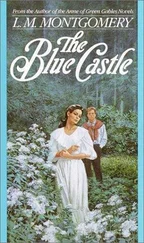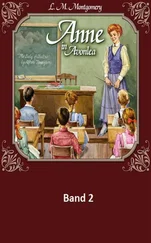"I see that you are an ungrateful and disobedient child," said Aunt Elizabeth.
This hurt Emily horribly, but she could not give in; and there continued to be a sense of soreness and disapproval between her and Aunt Elizabeth in all the little details of daily life that poisoned existence more or less for the child, who was so keenly sensitive to her environment and to the feelings with which her kindred regarded her. Emily felt it all the time — except when she was writing her stories. THEN she forgot everything, roaming in some enchanted country between the sun and moon, where she saw wonderful beings whom she tried to describe and wonderful deeds which she tried to record, coming back to the candle-lit kitchen with a somewhat dazed sense of having been years in No-Man's Land.
She did not even have Aunt Laura to back her up in the matter.
Aunt Laura thought Emily ought to yield in such an unimportant matter and please Aunt Elizabeth.
"But it's not unimportant," said Emily despairingly. "It's the most important thing in the world to me, Aunt Laura. Oh, I thought YOU would understand.”
"I understand that you like to do it, dear, and I think it's a harmless enough amusement. But it seems to annoy Elizabeth some way and I do think you might give it up on that account. It is not as if it was anything that mattered much — it IS really a waste of time.”
"No — no," said distressed Emily. "Why, some day, Aunt Laura, I'll write real books — and make lots of money," she added, sensing that the businesslike Murrays measured the nature of most things on a cash basis.
Aunt Laura smiled indulgently.
"I'm afraid you'll never grow rich that way, dear. It would be wiser to employ your time preparing yourself for some useful work.”
It was maddening to be condescended to like this — maddening that nobody could see that she HAD to write — maddening to have Aunt Laura so sweet and loving and stupid about it.
"Oh," thought Emily bitterly, "if that hateful Enterprise editor had printed my piece they'd have believed THEN.”
"At any rate," advised Aunt Laura, "don't let Elizabeth SEE you writing them.”
But somehow Emily could not take this prudent advice. There HAD been occasions when she had connived with Aunt Laura to hoodwink Aunt Elizabeth on some little matter, but she found she could not do it in this. THIS had to be open and above-board. She MUST write stories — and Aunt Elizabeth MUST know it — that was the way it had to be. She could not be false to herself in this — she could not PRETEND to be false.
She wrote her father all about it — poured out her bitterness and perplexity to him in what, though she did not suspect it at the time, was the last letter she was to write him. There was a large bundle of letters by now on the old sofa shelf in the garret — for Emily had written many letters to her father besides those which have been chronicled in this history. There were a great many paragraphs about Aunt Elizabeth in them, most of them very uncomplimentary and some of them, as Emily herself would have owned when her first bitterness was past, overdrawn and exaggerated.
They had been written in moments when her hurt and angry soul demanded some outlet for its emotion and barbed her pen with venom.
Emily was mistress of a subtly malicious style when she chose to be. After she had written them the hurt had ceased and she thought no more about them. But they remained.
And one spring day, Aunt Elizabeth, house-cleaning in the garret while Emily played happily with Teddy at the Tansy Patch, found the bundle of letters on the sofa shelf, sat down, and read them all.
Elizabeth Murray would never have read any writing belonging to a grown person. But it never occurred to her that there was anything dishonourable in reading the letters wherein Emily, lonely and — sometimes — misunderstood, had poured out her heart to the father she had loved and been loved by, so passionately and understandingly.
Aunt Elizabeth thought she had a right to know everything that this pensioner on her bounty did, said, or thought. She read the letters and she found out what Emily thought of her — of her, Elizabeth Murray, autocrat unchallenged, to whom no one had ever dared to say anything uncomplimentary. Such an experience is no pleasanter at sixty than at sixteen. As Elizabeth Murray folded up the last letter her hands trembled — with anger, and something underneath it that was not anger.
"Emily, your Aunt Elizabeth wants to see you in the parlour," said Aunt Laura, when Emily returned from the Tansy Patch, driven home by the thin grey rain that had begun to drift over the greening fields. Her tone — her sorrowful look — warned Emily that mischief was in the wind. Emily had no idea what mischief — she could not recall anything she had done recently that should bring her up before the tribunal Aunt Elizabeth occasionally held in the parlour. It must be serious when it was in the parlour. For reasons best known to herself Aunt Elizabeth held super-serious interviews like this in the parlour. Possibly it was because she felt obscurely that the photographs of the Murrays on the walls gave her a backing she needed when dealing with this hop-out-of- kin; for the same reason Emily detested a trial in the parlour.
She always felt on such occasions like a very small mouse surrounded by a circle of grim cats.
Emily skipped across the big hall, pausing, in spite of her alarm, to glance at the charming red world through the crimson glass; then pushed open the parlour door. The room was dim, for only one of the slat blinds was partially raised. Aunt Elizabeth was sitting bolt upright in Grandfather Murray's black horsehair chair. Emily looked at her stern, angry face first — and then at her lap.
Emily understood.
The first thing she did was to retrieve her precious letters. With the quickness of light she sprang to Aunt Elizabeth, snatched up the bundle and retreated to the door; there she faced Aunt Elizabeth, her face blazing with indignation and outrage.
Sacrilege had been committed — the most sacred shrine of her soul had been profaned.
"How dare you?" she said. "How dare you touch MY PRIVATE PAPERS, Aunt Elizabeth?”
Aunt Elizabeth had not expected THIS. She had looked for confusion — dismay — shame — fear — for anything but this righteous indignation, as if SHE, forsooth, were the guilty one. She rose.
"Give me those letters, Emily.”
"No, I will not," said Emily, white with anger, as she clasped her hands around the bundle. "They are mine and Father's — not yours.
You had no right to touch them. I will NEVER forgive you!”
This was turning the tables with a vengeance. Aunt Elizabeth was so dumbfounded that she hardly knew what to say or do. Worst of all, a most unpleasant doubt of her own conduct suddenly assailed her — driven home perhaps by the intensity and earnestness of Emily's accusation. For the first time in her life it occurred to Elizabeth Murray to wonder if she had done rightly. For the first time in her life she felt ashamed; and the shame made her furious.
It was intolerable that SHE should be made to feel ashamed.
For the moment they faced each other, not as aunt and niece, not as child and adult, but as two human beings each with hatred for the other in her heart — Elizabeth Murray, tall and austere and thin- lipped; Emily Starr, white of face, her eyes pools of black flame, her trembling arms hugging her letters.
"So THIS is your gratitude," said Aunt Elizabeth. "You were a penniless orphan — I took you to my home — I have given you shelter and food and education and kindness — and THIS is my thanks.”
As yet Emily's tempest of anger and resentment prevented her from feeling the sting of this.
"You did not WANT to take me," she said. "You made me draw lots and you took me because the lot fell to you. You knew some of you had to take me because you were the proud Murrays and couldn't let a relation go to an orphan asylum. Aunt Laura loves me now but you don't. So why should I love you?”
Читать дальше


